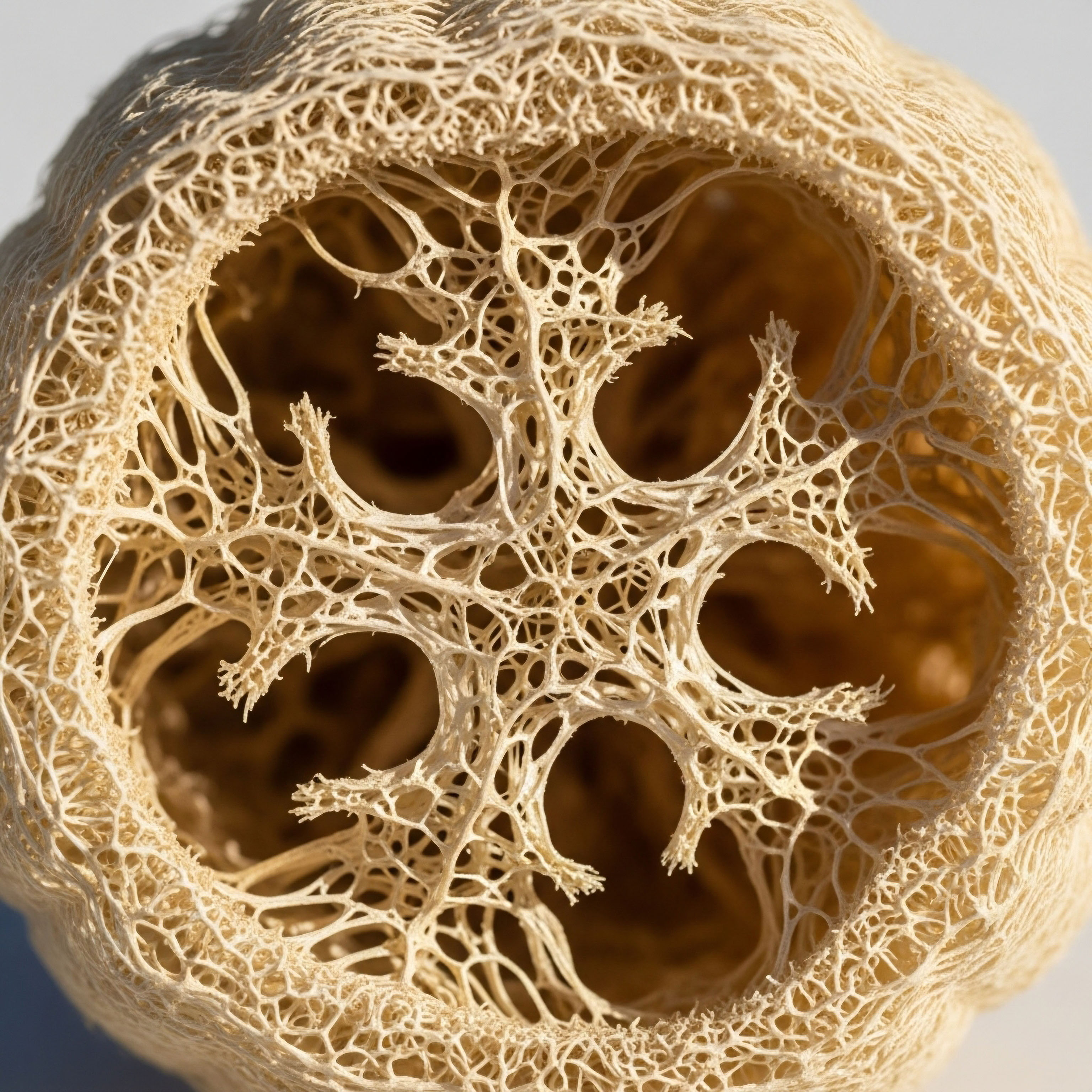

Fundamentals
Perhaps you have noticed a subtle shift, a quiet diminishment in the sharpness of your thoughts, a lingering mental fog that was not present before. You might find yourself searching for words that once came effortlessly, or experiencing a diminished capacity for sustained focus.
This experience, often dismissed as a natural consequence of aging or simply “being tired,” can feel isolating, leading to a quiet frustration. Understanding these changes requires looking beyond surface-level explanations and considering the intricate chemical messaging systems within your body.
The human body operates as a complex network of interconnected systems, where one area’s function profoundly influences another. Among these, the endocrine system, a collection of glands that produce and secrete hormones, serves as a master regulator. Hormones are biochemical messengers, traveling through the bloodstream to distant target cells and tissues, orchestrating a vast array of physiological processes. Their influence extends far beyond what many initially consider, reaching into the very architecture of your cognitive abilities and emotional regulation.
Hormones are vital biochemical messengers influencing diverse bodily functions, including cognitive processes.
Testosterone, often primarily associated with male reproductive health, holds a far broader physiological significance for both men and women. This steroid hormone, synthesized primarily in the testes in men and ovaries and adrenal glands in women, plays a critical role in maintaining muscle mass, bone density, and metabolic health.
Its presence, or lack thereof, extends its influence to mood stability, energy levels, and indeed, the clarity of thought. When levels of this hormone decline, whether due to age, stress, or other factors, the systemic impact can be widespread, touching upon aspects of vitality that are deeply personal.
For many, the conversation around hormonal health begins with symptoms like fatigue or reduced physical stamina. Yet, the subtle shifts in cognitive function ∞ a feeling of being less mentally agile, a reduced ability to concentrate, or even challenges with memory recall ∞ are equally valid indicators that warrant attention.
These experiences are not merely subjective complaints; they often reflect underlying biochemical imbalances that can be precisely identified and addressed. Recognizing these cognitive changes as potential manifestations of hormonal shifts marks a significant step toward reclaiming mental acuity.

The Endocrine System and Brain Function
The brain, a highly metabolically active organ, is exquisitely sensitive to hormonal fluctuations. Androgen receptors, which bind testosterone and its more potent derivative, dihydrotestosterone (DHT), are distributed throughout various brain regions. These regions include the hippocampus, crucial for memory formation, and the frontal cortex, involved in executive functions like planning and decision-making. The presence of these receptors indicates that testosterone directly influences neuronal activity and brain structure.
Beyond direct receptor binding, testosterone also influences brain function through its conversion into other neuroactive steroids. A portion of circulating testosterone is converted into estradiol, a form of estrogen, via the enzyme aromatase. Estrogen receptors are also widely distributed in the brain, playing roles in neuroprotection, synaptic plasticity, and mood regulation. This conversion highlights the interconnectedness of steroid hormones and their collective impact on central nervous system health.
Understanding your own biological systems is the first step in a personal journey toward reclaiming vitality. When symptoms like mental fogginess or diminished focus appear, it signals an opportunity to investigate the underlying hormonal landscape. This investigation moves beyond a simple diagnosis, aiming to uncover the specific biochemical pathways that may be contributing to your experience.

What Role Do Hormones Play in Mental Acuity?
Hormones act as the body’s internal communication network, transmitting signals that regulate nearly every physiological process. In the context of mental acuity, these chemical messengers influence neurotransmitter synthesis, neuronal growth, and the overall metabolic health of brain cells. For instance, adequate levels of testosterone support the maintenance of myelin, the protective sheath around nerve fibers that facilitates rapid signal transmission. A decline in testosterone can compromise this support, potentially slowing cognitive processing.
The intricate dance of hormones also affects cerebral blood flow, delivering essential oxygen and nutrients to brain tissue. Optimal blood flow is paramount for sustained cognitive performance, preventing the cellular stress that can lead to mental fatigue. When hormonal balance is disrupted, this delicate supply chain can be compromised, contributing to feelings of sluggishness and reduced mental clarity.
Recognizing the profound influence of hormones on brain function allows for a more comprehensive understanding of cognitive changes. It shifts the perspective from simply accepting age-related decline to actively seeking biochemical recalibration. This approach empowers individuals to address the root causes of their symptoms, paving the way for a renewed sense of mental sharpness and overall well-being.


Intermediate
Addressing hormonal imbalances requires a precise, evidence-based strategy. Testosterone Replacement Therapy, or TRT, represents a targeted intervention designed to restore physiological levels of this essential hormone. The protocols involved are not one-size-fits-all; they are carefully tailored to individual needs, considering biological sex, specific symptoms, and overall health markers. This section will detail the clinical approaches to TRT, explaining the rationale behind each component and how they work in concert to support systemic health.
The goal of hormonal optimization protocols extends beyond merely elevating a single hormone level. It involves supporting the entire endocrine system, ensuring that the body’s natural feedback loops remain as functional as possible while mitigating potential side effects. This comprehensive approach reflects a deep understanding of human physiology, recognizing that biochemical recalibration is a delicate process requiring careful oversight.
Hormonal optimization protocols aim to restore physiological balance and support the endocrine system comprehensively.

Testosterone Replacement Therapy for Men
For middle-aged to older men experiencing symptoms consistent with low testosterone, a standard protocol often involves weekly intramuscular injections of Testosterone Cypionate (200mg/ml). This specific ester of testosterone provides a stable release, helping to maintain consistent hormone levels throughout the week. The precise dosage is determined by individual response and blood work, aiming for optimal physiological ranges rather than supraphysiological levels.
To preserve natural testosterone production and fertility, Gonadorelin is frequently included in the protocol. This peptide, administered via subcutaneous injections typically twice weekly, stimulates the pituitary gland to release luteinizing hormone (LH) and follicle-stimulating hormone (FSH). These gonadotropins, in turn, signal the testes to produce testosterone and sperm, respectively. This co-administration helps to prevent testicular atrophy, a common side effect of exogenous testosterone administration alone.
Another crucial component for some men is Anastrozole, an aromatase inhibitor. Administered as an oral tablet, often twice weekly, Anastrozole helps to block the conversion of testosterone into estrogen. While some estrogen is essential for male health, excessive conversion can lead to undesirable side effects such as gynecomastia, water retention, and mood disturbances. Managing estrogen levels is a delicate balance, ensuring that benefits are maximized while risks are minimized.
In certain scenarios, particularly when supporting LH and FSH levels is a primary concern, Enclomiphene may be incorporated. This selective estrogen receptor modulator (SERM) works by blocking estrogen’s negative feedback on the hypothalamus and pituitary, thereby increasing the release of LH and FSH. This can stimulate endogenous testosterone production, making it a valuable tool for men seeking to optimize their own hormonal output or those considering fertility.

Male TRT Protocol Components
| Component | Administration | Primary Purpose |
|---|---|---|
| Testosterone Cypionate | Weekly intramuscular injection | Restores testosterone levels |
| Gonadorelin | 2x/week subcutaneous injection | Maintains natural testosterone production and fertility |
| Anastrozole | 2x/week oral tablet | Reduces estrogen conversion |
| Enclomiphene | Oral tablet (as needed) | Supports LH and FSH levels |

Testosterone Replacement Therapy for Women
Hormonal balance is equally vital for women, influencing everything from menstrual regularity to mood stability and cognitive function. For pre-menopausal, peri-menopausal, and post-menopausal women experiencing relevant symptoms, targeted testosterone therapy can be highly beneficial. The protocols for women differ significantly from those for men, utilizing much lower dosages to align with physiological needs.
A typical protocol involves Testosterone Cypionate, administered weekly via subcutaneous injection, usually in very small doses, such as 10 ∞ 20 units (0.1 ∞ 0.2ml). This precise dosing aims to restore testosterone to optimal female physiological ranges, addressing symptoms like low libido, fatigue, and mental fogginess without inducing virilizing side effects. The subcutaneous route allows for consistent absorption and easier self-administration.
Progesterone is a critical component, prescribed based on a woman’s menopausal status and individual hormonal profile. For pre-menopausal women, progesterone can help regulate menstrual cycles and alleviate symptoms of estrogen dominance. In peri-menopausal and post-menopausal women, it is essential for uterine health, particularly when estrogen therapy is also part of the regimen. Progesterone also has direct neuroprotective and mood-stabilizing effects.
Another option for women is Pellet Therapy, which involves the subcutaneous insertion of long-acting testosterone pellets. These pellets provide a steady release of the hormone over several months, offering convenience and consistent levels. When appropriate, Anastrozole may be co-administered, especially if there is a tendency for excessive testosterone-to-estrogen conversion, although this is less common in women due’ to lower baseline testosterone levels.

Female TRT Protocol Considerations
- Testosterone Cypionate ∞ Administered weekly via subcutaneous injection at low doses (0.1 ∞ 0.2ml).
- Progesterone ∞ Tailored based on menopausal status, supporting uterine health and mood.
- Pellet Therapy ∞ Offers long-acting testosterone release for sustained benefits.
- Anastrozole ∞ Used cautiously if estrogen conversion is a concern.

Post-TRT or Fertility-Stimulating Protocol for Men
For men who have discontinued TRT or are actively trying to conceive, a specific protocol is implemented to restore natural hormonal function and support fertility. This approach focuses on stimulating the body’s endogenous hormone production pathways, which may have been suppressed by exogenous testosterone.
The protocol typically includes Gonadorelin, continuing its role in stimulating LH and FSH release. This helps to restart the testes’ natural testosterone production and spermatogenesis. Additionally, Tamoxifen and Clomid, both SERMs, are often utilized. Tamoxifen can help block estrogen’s effects on breast tissue, while Clomid (clomiphene citrate) stimulates the pituitary to release more gonadotropins, thereby boosting testicular function.
Optionally, Anastrozole may be included in this post-TRT protocol if estrogen levels become elevated during the recovery phase. Managing estrogen is important to prevent negative feedback on the HPG axis, allowing for a more robust recovery of natural testosterone production. This comprehensive strategy aims to facilitate a smooth transition and optimize reproductive potential.

Growth Hormone Peptide Therapy
Beyond direct testosterone modulation, other biochemical recalibration strategies exist to support overall vitality and cognitive function. Growth Hormone Peptide Therapy represents one such approach, targeting active adults and athletes seeking benefits like anti-aging effects, muscle gain, fat loss, and improved sleep quality. These peptides work by stimulating the body’s natural production and release of growth hormone (GH).
Key peptides in this category include Sermorelin, a growth hormone-releasing hormone (GHRH) analog that stimulates the pituitary to secrete GH. Ipamorelin and CJC-1295 are often combined; Ipamorelin is a GH secretagogue, while CJC-1295 is a GHRH analog that extends the half-life of Ipamorelin, leading to a more sustained GH release.
Tesamorelin is another GHRH analog, specifically approved for reducing visceral fat. Hexarelin is a potent GH secretagogue, and MK-677 (Ibutamoren) is an orally active GH secretagogue that increases GH and IGF-1 levels. These peptides offer a pathway to support cellular repair, metabolic efficiency, and potentially neurocognitive health through their systemic effects.

Other Targeted Peptides
The field of peptide science offers additional targeted interventions for specific health concerns. PT-141 (Bremelanotide) is a peptide primarily used for sexual health, acting on melanocortin receptors in the brain to stimulate sexual arousal in both men and women. Its mechanism of action is distinct from traditional erectile dysfunction medications, focusing on central nervous system pathways.
Pentadeca Arginate (PDA) is another peptide with applications in tissue repair, healing, and inflammation modulation. Its actions are thought to involve promoting cellular regeneration and reducing inflammatory responses, which can be beneficial for recovery from injury or chronic inflammatory conditions. These peptides represent precise tools within a broader strategy of biochemical recalibration, addressing specific physiological needs.


Academic
The question of whether testosterone replacement therapy can improve cognitive function beyond mood regulation necessitates a deep exploration into neuroendocrinology. This inquiry moves beyond the subjective experience of feeling better emotionally, seeking to understand the direct and indirect mechanisms by which optimized testosterone levels might influence brain structure, function, and resilience. The brain is not merely a passive recipient of hormonal signals; it actively processes and responds to these biochemical cues, shaping our mental landscape.
Testosterone’s influence on the central nervous system is multifaceted, extending to neuronal morphology, synaptic plasticity, and neurotransmitter systems. Androgen receptors are expressed in various brain regions critical for cognitive processes, including the hippocampus, amygdala, and cerebral cortex. The binding of testosterone or its metabolite, dihydrotestosterone (DHT), to these receptors can modulate gene expression, influencing the synthesis of proteins essential for neuronal health and connectivity. This direct interaction suggests a foundational role for testosterone in maintaining cognitive integrity.
Testosterone influences brain function through direct receptor binding and modulation of neuroactive steroids.

Neurobiological Mechanisms of Testosterone Action
The brain’s response to testosterone is not limited to direct receptor activation. Testosterone serves as a precursor for neuroactive steroids, particularly estradiol, through the action of the enzyme aromatase, which is also present in brain tissue. Estradiol, in turn, binds to estrogen receptors (ERα and ERβ) widely distributed in the brain, exerting neuroprotective effects, promoting synaptic plasticity, and influencing memory consolidation.
This intricate interplay means that the cognitive benefits attributed to testosterone may, in part, be mediated by its conversion to estrogen within the brain.
Beyond steroidogenesis, testosterone impacts neurotransmitter systems that are fundamental to cognitive performance. Dopaminergic pathways, crucial for attention, motivation, and executive function, are influenced by androgen signaling. Studies indicate that testosterone can modulate dopamine synthesis and receptor sensitivity in regions like the prefrontal cortex. Similarly, the serotonergic system, involved in mood, learning, and memory, also shows sensitivity to androgen levels. A balanced neurotransmitter environment, supported by optimal hormonal status, is a prerequisite for peak cognitive performance.
Neuroinflammation, a chronic low-grade inflammatory state within the brain, is increasingly recognized as a contributor to cognitive decline. Testosterone possesses anti-inflammatory properties, potentially mitigating neuroinflammatory processes. It can influence microglial activation, the brain’s resident immune cells, shifting them towards a more protective, anti-inflammatory phenotype. By reducing chronic inflammation, testosterone may help preserve neuronal integrity and support optimal synaptic function, thereby indirectly supporting cognitive health.

Testosterone and Brain Structure
Research suggests that testosterone levels correlate with structural integrity in certain brain regions. For instance, studies using magnetic resonance imaging (MRI) have observed associations between lower testosterone levels and reduced gray matter volume in areas like the hippocampus and frontal lobes in aging men. While correlation does not imply causation, these findings suggest that chronic testosterone deficiency might contribute to structural changes that underpin cognitive decline.
Furthermore, testosterone may influence neurogenesis, the creation of new neurons, particularly in the hippocampus. This process is vital for learning and memory, and its impairment is linked to cognitive deficits. Animal models have shown that testosterone administration can promote neurogenesis, suggesting a potential mechanism by which TRT could support cognitive resilience. The ability to generate new brain cells, even in adulthood, represents a powerful avenue for maintaining cognitive vitality.

Cognitive Domains Potentially Influenced by TRT
| Cognitive Domain | Proposed Mechanism of TRT Influence | Supporting Evidence (General) |
|---|---|---|
| Spatial Memory | Modulation of hippocampal neurogenesis and synaptic plasticity. | Animal studies, some human observational data. |
| Executive Function | Influence on prefrontal cortex activity, dopamine pathways. | Neuroimaging studies, cognitive test performance. |
| Verbal Fluency | Impact on language processing centers, overall neural efficiency. | Clinical trials showing improvements in verbal tasks. |
| Processing Speed | Support for myelin integrity, reduced neuroinflammation. | Indirect evidence from systemic effects. |

Interplay with Metabolic Pathways and Overall Systemic Health
The endocrine system does not operate in isolation; its function is deeply intertwined with metabolic health. Testosterone deficiency is often associated with metabolic syndrome, insulin resistance, and increased visceral adiposity. These metabolic dysregulations can independently contribute to cognitive impairment through mechanisms such as chronic inflammation, oxidative stress, and impaired cerebral glucose metabolism.
By optimizing testosterone levels, TRT can improve metabolic parameters, including insulin sensitivity and body composition. These systemic improvements can indirectly benefit cognitive function by reducing the metabolic burden on the brain. A healthier metabolic environment supports neuronal energy production, reduces cellular damage, and promotes overall brain resilience. This holistic view underscores that cognitive benefits from TRT may arise not only from direct neurobiological effects but also from a broader improvement in systemic metabolic health.
The Hypothalamic-Pituitary-Gonadal (HPG) axis, the central regulatory pathway for sex hormones, is itself sensitive to metabolic signals. Chronic stress, poor nutrition, and inflammation can disrupt the delicate balance of this axis, leading to suboptimal hormone production. TRT, by restoring physiological testosterone levels, can help stabilize this axis, creating a more favorable environment for overall endocrine and metabolic harmony. This recalibration extends its benefits to the brain, which thrives in a state of systemic equilibrium.

Clinical Evidence and Considerations
Clinical trials investigating the impact of TRT on cognitive function have yielded mixed results, reflecting the complexity of the brain and the multifactorial nature of cognitive decline. Some studies have reported improvements in specific cognitive domains, such as spatial memory and executive function, particularly in hypogonadal men. Other studies have shown less consistent or no significant improvements, suggesting that the response may be highly individualized, dependent on baseline cognitive status, duration of deficiency, and other comorbidities.
It is important to consider that cognitive decline is a complex phenomenon influenced by numerous factors beyond hormonal status, including genetics, lifestyle, cardiovascular health, and neurological conditions. TRT should be viewed as one component within a comprehensive wellness strategy, not a standalone solution for all cognitive challenges. A thorough clinical assessment, including detailed cognitive evaluations and comprehensive laboratory testing, is essential to determine the appropriateness and potential benefits of TRT for cognitive support.
The long-term effects of TRT on cognitive health are still an area of active research. While short-to-medium term studies offer promising insights, ongoing investigation is needed to fully understand the sustained impact of hormonal optimization on neurocognitive trajectories, particularly in aging populations. The clinical translator’s role involves synthesizing this evolving body of evidence, providing clear, data-informed guidance that respects the individual’s unique biological landscape and health aspirations.

References
- McEwen, Bruce S. “Central effects of sex hormones in the brain ∞ neuroendocrine, neurotrophic, and neuroprotective actions.” Molecular Neurobiology, vol. 17, no. 1-3, 1998, pp. 147-154.
- Roselli, Charles E. and Robert W. Resko. “Aromatase and 5α-reductase in the brain.” Frontiers in Neuroendocrinology, vol. 20, no. 1, 1999, pp. 1-16.
- Viau, Victor, and Michael J. Meaney. “The inhibitory effect of testosterone on hypothalamic-pituitary-adrenal activity is mediated by the medial preoptic area.” Brain Research, vol. 679, no. 1, 1995, pp. 47-55.
- Handa, Robert J. et al. “Testosterone and the aging brain ∞ mechanisms of neuroprotection.” Frontiers in Neuroendocrinology, vol. 32, no. 2, 2011, pp. 135-142.
- Moffat, Scott D. et al. “Longitudinal change in cognitive function in healthy aging men and its relationship to testosterone and estradiol levels.” Journal of Clinical Endocrinology & Metabolism, vol. 91, no. 6, 2006, pp. 2085-2091.
- Spritzer, Pamela M. et al. “Testosterone and neurogenesis ∞ effects on adult hippocampal neurogenesis.” Hormones and Behavior, vol. 61, no. 3, 2012, pp. 310-318.
- Holscher, Christian. “Insulin, incretins and the brain ∞ central and peripheral effects in the control of metabolism and in neurodegeneration.” Progress in Neurobiology, vol. 123, 2014, pp. 1-14.
- Resnick, Susan M. et al. “Testosterone treatment and cognitive function in older men ∞ a randomized controlled trial.” Journal of Clinical Endocrinology & Metabolism, vol. 95, no. 11, 2010, pp. 5027-5036.

Reflection
Your personal health journey is a dynamic process, not a static destination. The insights shared here regarding hormonal health and its intricate connection to cognitive function serve as a starting point for deeper self-understanding. Recognizing the subtle shifts in your mental acuity and connecting them to underlying biological systems is a powerful act of self-awareness. This knowledge empowers you to ask more precise questions about your well-being.
Consider this exploration not as a definitive answer, but as an invitation to introspection. What are the specific sensations you experience? How do these align with the biological mechanisms discussed? Every individual’s endocrine landscape is unique, shaped by genetics, lifestyle, and environmental factors. A personalized path toward optimal vitality requires a nuanced understanding of your own unique biochemical signature.

Your Path to Reclaimed Vitality
The information presented underscores that hormonal optimization is a precise science, best navigated with expert guidance. It is about recalibrating your body’s innate intelligence, not simply chasing a number on a lab report. This journey involves careful assessment, thoughtful protocol design, and continuous monitoring to ensure that interventions align with your specific physiological needs and aspirations.
Reclaiming mental sharpness and overall vitality is within reach when you approach your health with a systems-based perspective. This involves recognizing the interconnectedness of your hormones, metabolism, and neurological function. The potential for a more vibrant, cognitively agile self awaits those willing to explore the depths of their own biological systems with precision and purpose.



